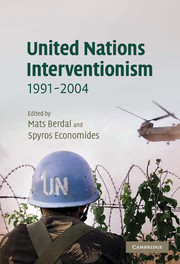8 - Kosovo
Published online by Cambridge University Press: 22 September 2009
Summary
Introduction
The inherent paradox in the United Nation's (UN) interventionary role in Kosovo is that it did not occur until after a ceasefire had been reached on the ground. In fact, as this chapter examines, one of the two major questions relating to the UN's role in the Kosovo war was that the UN Security Council (UNSC) in particular, was bypassed by the major Western powers that employed NATO as the vehicle for their intervention. As a result, this undermined the authority of the UNSC as the legitimating body for international interventions both in terms of the maintenance of international peace and security and on the basis of humanitarian concerns giving rise to the ‘doctrine of humanitarian intervention’. As NATO dispensed with the normal practice of seeking a UNSC resolution to mandate its action, both the legality and moral underpinning of the operation were heavily questioned.
A second major issue raised for the UN by the Kosovo crisis relates to the evolution of the UN's' functions as the lead organisation in the international administration of war-torn territories. Through the UN Interim Administration Mission in Kosovo (UNMIK), the UN assumed responsibility for the civilian administration of post-War Kosovo. In practice, UNMIK has been governing a de facto protectorate, kept in relative peace by the maintenance of a weighty, NATO-led military and security presence, the Kosovo Force (KFOR).
- Type
- Chapter
- Information
- United Nations Interventionism, 1991–2004 , pp. 217 - 245Publisher: Cambridge University PressPrint publication year: 2007
- 2
- Cited by



